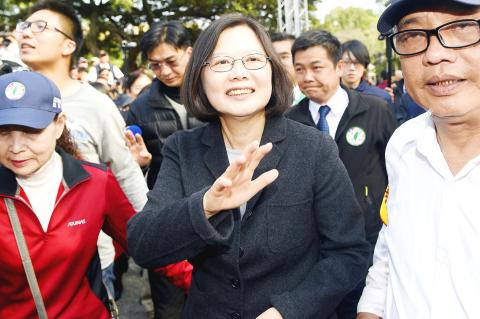Democratic Progressive Party (DPP) Chairperson Tsai Ing-wen (蔡英文), during a ceremony to commemorate the 68th anniversary of the 228 Incident yesterday, called for an end to “mistakes in history” and for the establishment of Taiwan as an “authentically free and democratic” nation.
With police ubiquitous near entrances and barbed wire ringing park walls, a solemn crowd of several hundred gathered in front of the 228 Memorial Monument, with most participants quietly holding up white chrysanthemums to symbolize mourning for the 228 victims.
Strong political symbolism infused the service, which was conducted in Hoklo (commonly known as Taiwanese) and attended by many prominent pan-green politicians.

Photo: Chen Chih-chu, Taipei Times
“It’s only been a little more than 20 years since authoritarian rule ended in Taiwan, and we have yet to achieve complete success in transitional justice and locally oriented education, as well as our efforts in seeking fairness and justice, and we’re often met with challenges from conservatives,” Tsai said.
“I would like to promise all of you here that if the DPP has another chance to be in power, we will face these challenges bravely, seriously pushing for transitional justice, democratic education and social justice, so that democracy in Taiwan will be more progressive and strong, so that more young people will have the opportunity to be more familiar with Taiwan, and to have a better understanding of our past,” she added.
“Each one of us Taiwanese has a mission: We should put an end to all mistakes in history and, for generations to come, we will make Taiwan an authentically free and democratic country,” she said.
Taiwan Nation Alliance chairman Wu Shu-min (吳樹民) echoed Tsai’s statement, voicing his expectation that Tsai will lead Taiwanese in the search for transitional justice.
“I’m looking forward to Tsai having the opportunity to lead all Taiwanese in the realization of transitional justice next year, and to bestow justice on all 228 victims by discovering the full truth,” he said.
The ceremony opened with a singing of Taiwan the Green (台灣翠青), a Taiwanese Presbyterian Church hymn which has been promoted as Taiwan’s “national anthem” by many independence activists. Taiwanese composer Hsiao Tyzen (蕭泰然) — who passed away last week — set the hymn to music and included it in his 1947 Overture (一九四七序曲), composed in commemoration of the 228 Incident.
A memorial concert was also held, with participants sharing squid surimi (魷魚糜), the dish the family of several prominent victims were preparing when they were arrested.
Independent Taipei Mayor Ko Wen-je (柯文哲) was notably absent, despite being listed as a memorial service speaker.

Chinese Nationalist Party (KMT) Chairman Eric Chu (朱立倫), spokeswoman Yang Chih-yu (楊智伃) and Legislator Hsieh Lung-chieh (謝龍介) would be summoned by police for questioning for leading an illegal assembly on Thursday evening last week, Minister of the Interior Liu Shyh-fang (劉世芳) said today. The three KMT officials led an assembly outside the Taipei City Prosecutors’ Office, a restricted area where public assembly is not allowed, protesting the questioning of several KMT staff and searches of KMT headquarters and offices in a recall petition forgery case. Chu, Yang and Hsieh are all suspected of contravening the Assembly and Parade Act (集會遊行法) by holding

PRAISE: Japanese visitor Takashi Kubota said the Taiwanese temple architecture images showcased in the AI Art Gallery were the most impressive displays he saw Taiwan does not have an official pavilion at the World Expo in Osaka, Japan, because of its diplomatic predicament, but the government-backed Tech World pavilion is drawing interest with its unique recreations of works by Taiwanese artists. The pavilion features an artificial intelligence (AI)-based art gallery showcasing works of famous Taiwanese artists from the Japanese colonial period using innovative technologies. Among its main simulated displays are Eastern gouache paintings by Chen Chin (陳進), Lin Yu-shan (林玉山) and Kuo Hsueh-hu (郭雪湖), who were the three young Taiwanese painters selected for the East Asian Painting exhibition in 1927. Gouache is a water-based

Taiwan would welcome the return of Honduras as a diplomatic ally if its next president decides to make such a move, Minister of Foreign Affairs Lin Chia-lung (林佳龍) said yesterday. “Of course, we would welcome Honduras if they want to restore diplomatic ties with Taiwan after their elections,” Lin said at a meeting of the legislature’s Foreign Affairs and National Defense Committee, when asked to comment on statements made by two of the three Honduran presidential candidates during the presidential campaign in the Central American country. Taiwan is paying close attention to the region as a whole in the wake of a

OFF-TARGET: More than 30,000 participants were expected to take part in the Games next month, but only 6,550 foreign and 19,400 Taiwanese athletes have registered Taipei city councilors yesterday blasted the organizers of next month’s World Masters Games over sudden timetable and venue changes, which they said have caused thousands of participants to back out of the international sporting event, among other organizational issues. They also cited visa delays and political interference by China as reasons many foreign athletes are requesting refunds for the event, to be held from May 17 to 30. Jointly organized by the Taipei and New Taipei City governments, the games have been rocked by numerous controversies since preparations began in 2020. Taipei City Councilor Lin Yen-feng (林延鳳) said yesterday that new measures by